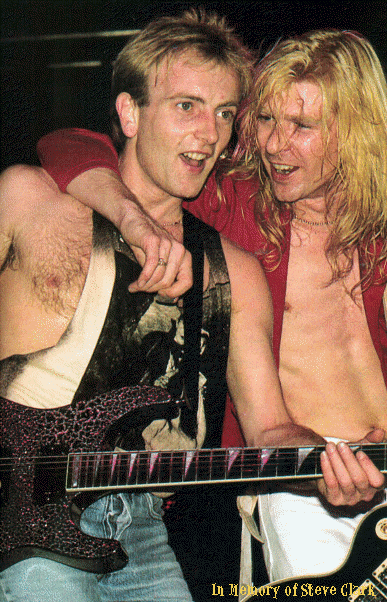|
|
|
Def Lep’s Phil Collen
and Steve Clark:
Axes Ahoy
Written by Jeff Moses
 There's
a black cloud looming over Def Leppard. Literally. For six sold-out shows in New
York, the band has played outside in the pouring rain. Or, as Phil Collen says,
"It's pissing down with rain here. You would not believe it!"
Considering the long chain of misfortune that has been following the band, yes,
you can believe it. The shocking part is that Mr. Collen is actually laughing as
he says this.
There's
a black cloud looming over Def Leppard. Literally. For six sold-out shows in New
York, the band has played outside in the pouring rain. Or, as Phil Collen says,
"It's pissing down with rain here. You would not believe it!"
Considering the long chain of misfortune that has been following the band, yes,
you can believe it. The shocking part is that Mr. Collen is actually laughing as
he says this.
And why not laugh? Def Leppard's new album, Hysteria, ruled the charts and is selling like hotcakes; the video "Pour Some Sugar on Me" was number one on MTV; and their live shows are going very well despite the weather. But bear in mind that this is the same band whose drummer lost an arm in a tragic accident, whose singer had severe mumps and whose guitarists and producer have all been in auto mishaps. The black cloud has been mighty busy with these boys.
When Def Leppard recruited Phil Collen for their hugely successful Pyromania album, they solidified the heavy two-guitar sound that has catapulted them to superstardom. From the outset, Collen and coguitarist Steve Clark ventured to do something different with the two-guitar format. According to Phil, "A lot of two-guitar bands either play exactly the same or are in competition with each other. The way we view it the song is the most important thing. And we're all working toward the same thing. There's no use in someone showing off if it's going to make the song sound crappy— then no one's going to like it."
 Steve
Clark is very happy in his partnership with Collen as well. "It's great. A
lot of groups can do things in the studio with one guitar but when they try to
reproduce it live, there are many things lacking. Phil and I decided, when we
did the Hysteria album, that we really didn't want to be playing the same block
of chords, as a lot of groups do. So we play two separate parts that, when you
hear them together, make sense; but when you hear them on their own, they don't
really relate to anything. We tried to do that from the start, and it's
obviously paid off. There's virtually no time on the record when we are playing
the same thing. It's really enjoyable."
Steve
Clark is very happy in his partnership with Collen as well. "It's great. A
lot of groups can do things in the studio with one guitar but when they try to
reproduce it live, there are many things lacking. Phil and I decided, when we
did the Hysteria album, that we really didn't want to be playing the same block
of chords, as a lot of groups do. So we play two separate parts that, when you
hear them together, make sense; but when you hear them on their own, they don't
really relate to anything. We tried to do that from the start, and it's
obviously paid off. There's virtually no time on the record when we are playing
the same thing. It's really enjoyable."
The technique of playing two entirely different parts suits Collen and Clark just fine. Both players have very different, yet distinct styles. Steve Clark is a classically trained musician who can read music. He says of his playing, "I play the roots a lot more and try to put as much melody in it as I can where Phil tends to play faster."
Phil Collen, on the other hand, is a school-of-the-streets rocker who taught himself to play the guitar. Originally inspired to buy an axe by the playing of Ritchie Blackmore, ColIen went on to listen to Jan Ackerman, John McLaughlin, Al DiMeola and a host of other heavies. But while he was picking up licks from the jazier side of the tracks, Collen says, "I was more interested in the rock thing than jazz. I always thought there was a little something missing in it."
 As
his playing progressed he began learning the ropes with a fairly successful
English band called Girl. It was while playing with Girl that Collen met the Lep
boys. When it was time for Def Leppard to fill the vacant second-guitar slot
before working on Pyromania, the vote was cast, and Phil was summoned.
As
his playing progressed he began learning the ropes with a fairly successful
English band called Girl. It was while playing with Girl that Collen met the Lep
boys. When it was time for Def Leppard to fill the vacant second-guitar slot
before working on Pyromania, the vote was cast, and Phil was summoned.
Collen's playing took a quantum leap when, in an attempt to shed a couple of pounds, he gave up drinking. "When I stopped drinking, my playing improved drastically. I started feeling so good from it that I just kept on. It's cool."
After the gigantic popularity of Pyromania there began a long period of setbacks. First, the band scrapped several tracks and many months' work on the new album because they were not happy with the sound they were getting. Then drummer Rick Allen lost an arm in a car accident. After six weeks in the hospital, Allen was back with a new specially designed drum set and a desire to rock.
"With Rick's accident, it made us closer and a bit more determined. If a guy's going to come out of the hospital after six weeks and carry on playing drums, it made what we were up against seem really trivial," says Phil. But the bad times didn't stop then. Singer Joe Elliott contracted mumps, which threatened his voice. Then Steve and Phil took a brief journey through a shop window in Steve's car. The police took a great interest in the event, believing that it was a stolen vehicle.
 "We
went through some really depressing times, but we decided to carry on working—whatever
happened. We didn't sit around and think about it too much, especially after
Rick's accident. We thought we could mope around for a couple of months, but
what we did was go back in the studio a couple of days later and carry on where
we left off," says Steve of the dark days before Hysteria's release.
"We
went through some really depressing times, but we decided to carry on working—whatever
happened. We didn't sit around and think about it too much, especially after
Rick's accident. We thought we could mope around for a couple of months, but
what we did was go back in the studio a couple of days later and carry on where
we left off," says Steve of the dark days before Hysteria's release.
When Hysteria finally hit record-store shelves, four years after Pyromania, it was evident that it was well worth the wait. What is the key to Def Leppard's success? "I haven't got a clue!" fibs Phil Collen. ActualIy, it seems that Lep's audience is swelling at an alarming rate. "We wanted to make a record that would appeal to more than just heavy-metal fans, so we could still retain the audience that we had, but also cross over to people who might even buy an Elton John record," comments Steve.
One thing that is certain, Hysteria is vastly different from a typical heavy-metal album. Although there are some hard-hitting tracks, the predominant groove is probably more suited to a dance club than a moshfest. Phil explains it this way: "I just think it's a maturity in our songwriting. We've always been lumped in with a lot of bands that we really don't sound anything like—like Iron Maiden and Judas Priest. It's almost a different form of music, what we do. The only thing that we have in common with them is that we, play loud."
This decidedly pop approach means that the guitars, while not out of the picture, do have to play a subservient role to the vocals and melody. In arranging the material for the record, Steve says, "We came up with really simple block chords with really strong melodies for the vocals. Then, when we had decided about the vocals, we'd just write melodies around the vocals. And so we'd come up with one thing, and then I would play, or Phil would play something 180 degrees in the other direction; so the guitar parts don't run across each other. We tried to do that after the vocal was down. We didn't want it to affect the vocal line. We wanted to play in the gaps that the vocals left."
As far as divvying up the solo chores goes, Steve says that there's no problem. "It's just split down the middle. We play equal solos live and on the records. We're very evenly matched. It's just very obvious, with Phil and myself, when we do a song, who's more suited to do the solo. We don't sit around and think about it. One person just goes into it, and it's obvious who's better to play the part." So there are no struggles, no professional competition or jealousy? "No, we sometimes look at each other, and just by a glance we can tell. When we're jamming songs, he'll say, 'Why don't you go for it?' or I'll say, 'Go for it,' to him. We really don't think about it too much."
As with every pop band in the late '80s, Def Leppard has relied heavily on music videos to deliver their message. In fact, "Pour Some Sugar on Me" absolutely dominated MTV's playlist for about 40 or 50 weeks. The fact that the video consists of footage taken from live stage action gives viewers a chance to see what they would be getting at a concert. The band's endearing personalities show through the tired format and really add to the catchiness of the song. Says Steve of the success of "Sugar," "It really went nuts after it came out." No kidding. It blasted the single to the number-two position on the charts.
As to the importance of videos, Phil says, "These days it's just part of the format. If you ignore stuff like that, you're just cutting your nose off to spite your face."
Four years to put out an album is a long time. Longer still if you consider what the band had gone through during that period. For Steve Clark and Phil Collen, guitars and Def Leppard are a way of life, or as Steve says, "We can't do anything else but play music. Nobody would be able to get a regular job."
The story of Def Leppard is really the story of keeping a stiff upper lip. At the time this interview was conducted, Steve Clark had just broken a finger on his right hand and was sporting a new cast. Was it getting him down? No, he was laughing and hustling to get to soundcheck ontime.